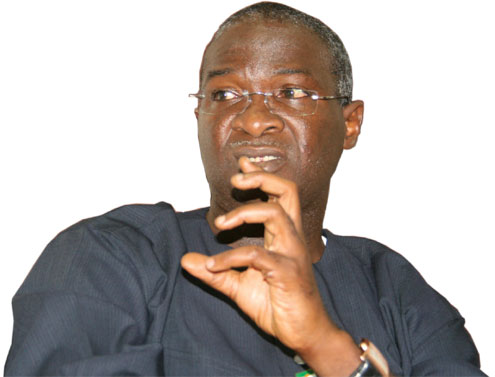Before I venture into the heart of my presentation, let me share with you the verbatim report of a text message I received on the 2nd May 2019 which reads:
“Your excellency, Sir I truly apologised for disturbing you sir. Last year March. I sent a msg to you sir concerning some PHCN staff exploiting us for money in Aborishade/Olufowobi street in Lawanson, Lagos concerning our transformer. They demanded #1.3M from us then hence my msg to you sir for help and this was promptly done. Repairs on d transformer was effected within 3 days of my complaint to you sir without us paying a dime.
This obviously did not go down well with those who made d demand. Exactly a year in March, we experienced d same issue on our transformer. They demanded for money which we all contributed. They assured us that a new transformer will be brought 2 wks ago, but nothing had been done. We have been in darkness since March. As at this morning, we learnt that they are demanding for more money.
My honourable Minister, kindly help us out of this predicament. unscrupulous elements in the PHCN are denting the image of your hard working ministry. May God bless you sir as you respond to our distress call as usual.”
What is important and instructive for my purpose is the reported reference to PHCN a Company that has been broken up into 11 distribution companies (DisCos), 1 Transmission Company (TCN) and 6 Generation companies (GenCos).
So, while she is being served by a DisCo, she still clings to the nomenclature of PHCN.
The lesson for me and which I commend to all is that change management is not a sprint. It is a marathon.
This is the context in which I propose to speak today and hopefully address;
a) Those who argue for a review of privatization, which in this topic is now addressed as “Re-thinking the model”;
b) The role that governments (Federal, State and Local) can play rather than the challenges which are already known
c) The role that all of us as consumers must pIay, rather than just limiting it to the role of those operating in the power sector industry as suggested in the topic.
Permit me to point out that while we may seek to learn from other models, we must be cautious in ensuring that we compare only like with like or with similar.
In this sector, one area of difference between our privatization model and what I know of the European models is that the assets were privatized as on-going and functional undertakings requiring only private sector managerial models to optimize commercial value.
In our case the assets sold were not viable on-going concerns, they were in many cases aging, derated and unserviced assets; and the service was disappointing. This is what led us to privatization.
The difference is that our model requires more private capital injection to achieve reliable service while capital injection in the EU will improve already reliable service.
REALITY OF PRIVATIZATION
When people call me to complain about the level of service either of power supply, bad equipment, excessive billing, they do so without adverting their minds to our reality or are in total ignorance of the reality.
The reality before privatization is that the Ministry of Power had over 50,000 staff, owned trucks, employed electricians who went out to repair faults, the Ministry controlled power stations like Jebba, Kainji, Shiroro, Egbin to mention a few and the Ministry employed all of those who worked in Distribution.
All that is gone, since November 2013.
From over 50,000 staff, the Ministry now has a staff strength of 729 people.
There are no electricians, fitters, repair vehicles or distribution staff in our ministry anymore and we do not supply, repair or replace distribution transformers or meters.
All of these are now the work of the DisCos, under contract with BPE and under license by NERC as a matter of Law.
So, if the DisCos are not performing, what can the minister do?
By law, the Electric Power Sector Reform Act of 2005 (EPSRA), the minister is not empowered to issue directives to DisCos directly. He can issue directives to:
a) NERC to exercise their regulatory power over DisCos or GenCos and this includes for non-performance or to license a competing company to provide an alternative to non-performance.
b) BPE who has a performance contract with DisCos to enforce the terms and condition of the contract.
It is such directives from the minister that has led to Regulations being made by NERC to license Meter Asset Providers to bridge the metering gap that DisCos cannot cover and Eligible customers to allow consumers who utilize up to 2 MW and are not satisfied with what the DisCos give them, to buy their power directly from the GenCos.
Is this the best model you might ask?
I think the law is good and until we fully implement it and see its flaws, it is premature to complain about the law.
REVIEW OF PRIVATIZATION
Is the privatization process perfect? No, it is not.
Some of its imperfections have been admitted even by the beneficiaries and I will not dwell on them.
What I will dwell on are the steps being taken by government through the ministry, departments and agencies concerned with power by exercising our authority under the EPRSA to formulate policy and issue directives.
To those who call for a “review “ of the privatization for example, I have asked them to step out of the context of that nebulous term called a review and specify what they mean.
POWER SECTOR RECOVERY PROGRAMME (PSRP)
The ministry has developed the Power Sector Reforms Programme (PSRP) in consultation with the National Assembly, stakeholders in the sector, and the World Bank, which has been approved by the Federal Executive Council.
The PSRP is a set of policies, actions and programmes that identifies all the problems in the sector post privatization and proffers solution and assigns responsibility for action.
They cover poor customer service, meter supply, energy theft, funding gaps, procurement compliance, transmission issues, MDA debts, Tariff setting to mention a few.
Therefore, some of the following developments that have happened in the sector are part of the PRSP to reform, respond to and resolve the challenges thrown up by privatization:
a) Payment of N27 Bn MDA debts to Discos and monthly directives to the Ministry of Finance to settle government debts as approved by FEC;
b) N701 billion payment assurance facility to NBET to enable her pay more to GenCos, to cover shortfall of connection from DisCos
c) Appointment of Chairman of NERC to ensure the Regulatory commission is properly constituted to act
d) Eligible costumer policy to provide an alternative access to power for large consumers (like manufacturers) who are not satisfied with their DisCo
e) Meter Asset Provider to create an alternative source of supply of meters to consumers apart from direct supply from DisCos
f) 10 (ten) year transmission expansion plan to increase transmission capacity
g) Recovery of 720 abandoned containers to complete about 90 transmission projects and some power generation plants awarded by previous administrations.
h) Approval by FEC of N72 Billion for investment in Distribution equipment to help distribute unutilized 2000 MW available energy
i) Rapid deployment of off-grid capacities as an alternative to the on-grid supply, to provide captive power supply to under-served and unserved communities and clusters like markets, universities and rural communities.
This is our own review and there are more actions under consideration as the Vice-President recently indicated, which the President has mandated us to consider.
For advocates of review who think that licenses of DisCos should not be renewed (or should be cancelled), that power exists but is not vested in the ministry or the minister.
The power is vested in the Regulator under sections 73 and 74 of the EPSRA which provides that :
Section 73(1) provides that :
“Subject to this Section, the Commission may, at any time, amend a licence or any term or condition of a licence;” and this can be done
(a) If a customer, an eligible customer, consumer association or association of eligible customers make a complaint
(b) On the initiative of the Commission
Section 74(2) provides that upon receiving a complaint from a customer or eligible customer or an association of them or on its own initiative that:
“(2) Subject to this section and after an inquiry , including an opportunity for the licensee (GenCo, DisCo , TCN) to show cause as to why the licence should not be cancelled , the Commission may cancel any licence if in its opinion :”
(b) the licensee has wilfully or unreasonably contravened any provision of this Act…
(c ) the financial position of the licensee is such that he is unable to fully and effectively discharge the duties and obligations imposed by the licence
Section 75
deals with enforcement of the terms of the licence and included penalties for non-compliance
While the case may exist for the exercise of that power to amend or cancel a license for non-performance, I am of the clear view that ministerial action is not contemplated by this provision of the law.
ROLE OF THE STATES
The provisions of the 1999 Constitution (as amended) in Items 14 and 15 of part II of the Second schedule, in the CONCURRENT LEGISLATIVE LIST clearly sets out what the states can do. It provides that:
14. A House of Assembly may make laws for the State with respect to-
(a) Electricity and the establishment in that State of electric power stations.
(b) the generation, transmission and distribution of electricity to areas not covered by a national grid system within that State; and
(c) the establishment within that State of any authority for the promotion and management of electric power stations established by the State.
15. In the foregoing provisions of this item, unless the context otherwise requires, the following expressions have the meanings respectively assigned to them –
‘distribution’ means the supply of electricity from a substation to the ultimate consumer;
‘management’ includes maintenance, repairs or replacement;
‘power station’ means an assembly of plant or equipment for the creation or generation of electrical energy, and
‘transmission’ means the supply of electricity from a power station to a sub-station or from one sub-station to another sub-station , and the reference to
‘sub-station’ herein is a referenced to an assembly of plant, machinery or equipment for distribution of electricity
Clearly therefore, contrary to widely held beliefs:
a) State governments can establish their own power stations
b) Can generate, transmit and distribute electricity in areas not covered by the National grid within that state
c) Establish their own electricity to promote and manage their own power stations.
So, when we talk about communities not connected to any power supply system, these communities exist within local government areas, Federal constituencies, senatorial districts and within the States.
They are clearly not areas covered by the Grid and therefore constitute a viable area of intervention by a state government to contract their own power supply without reference to the federal government.
WHAT THE PEOPLE CAN DO
Apart from protecting electrical installations, paying our bills, helping to stop energy theft and interacting more with our Discos who are the interface with consumers, we must also consciously conserve energy and reduce waste.
In addition, those who are self-generating through diesel or petrol generators must understand that their cost of self-generation at over N100 kw/h is much higher than public power.
Since nothing stops them from using generators, there is nothing that should stop them from converting their generators to cleaner and cheaper energy sources like solar panels on their roof tops.
This is a practice that I see gaining ground as I travel across the country and one which I encourage
.
It is consistent with the practice in other jurisdictions where on-grid power is complemented with off-grid supply.
Babatunde Raji Fashola, SAN
Honourable Minister of Power Works and Housing.
 Hottestgistnaija.com
Hottestgistnaija.com





